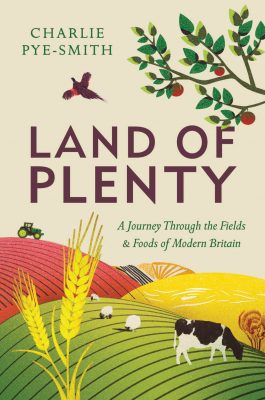
This is an interesting and well-written book about farming and food. It is definitely in the farmer-sympathetic camp, which is fine but also gets close to being in the ‘agriculture is doing well’ camp which I find a little irritating. But I learned a lot from it and it is a good read.
The format is that the author visits several farms and discusses their ways of working and successes and tribulations – and that therefore the reader gets an insight into many different farming types, upland and lowland, livestock and arable, traditional and less so.
I found the chapter on pig-rearing ‘Outdoors good, indoors bad!‘ a most interesting read, and the answer, if there is one, is nowhere near as clear cut as the reference to Animal Farm might suggest.
Pye-Smith mentions the fact that the State of Nature report showed that wildlife depending on the farmed environment was doing badly in the UK, correctly points out that some of the worst predictions of doom have not happened and then goes on to describe some of the good guys and what they are doing. But he doesn’t come back to say that the good guys are too few and their good work is swamped by the indifference of most farmers. Good practice is only good enough to solve the problem of tumbling wildlife when it is common practice and that requires either a change inside farmers’ heads or a change in public support for farming to nudge or shove it in the right direction.
And that public support, which underpins the lives of most (not quite all because a few agricultural sectors are outside of the CAP) of the farmers interviewed in these pages, is mentioned a little but not too much. We are all paying for the type of farming in the countryside, both the good and the bad, and that’s why the public should have a bigger say in things and that’s why Michael Gove needs to get a much better England farming strategy in place post-Brexit.
The author was slightly hampered by the Brexit result – everything is uncertain and the preparation of this book straddled the events of the referendum vote and the confusion which followed. Timing is everything and, of course, the lives of each one of these farming families will depend on how close we remain (or Remain) to the EU and its standards and regulations and tariffs and how much we are playing on a world stage and importing cheap food from all round the world and failing to sell our produce to many of the current markets.
I like the way the author writes and I’d love him to nip round all these farmers in 2021 and see how they are all getting on and whether they welcome…I was going to write ‘our exit from the EU’, but I’ll just say ‘wherever we are then’.
This book is a good read about things that are of importance to us all – we all eat, many of us enjoy the countryside for leisure and we are all paying for what goes on through our pockets and our taxes.
Land of Plenty: a journey through the fields and foods of modern Britain by Charlie Pye-Smith is published by Elliott and Thompson.
 Behind More Binoculars by Keith Betton and Mark Avery is now published (by Pelagic). Here’s a very kind review of it. You can still buy it directly from Pelagic with a 30% discount using the code BMB30.
Behind More Binoculars by Keith Betton and Mark Avery is now published (by Pelagic). Here’s a very kind review of it. You can still buy it directly from Pelagic with a 30% discount using the code BMB30.
[registration_form]
These good guys are so few and far between that only local wildlife benefits. National declines will continue unless there is joined-up thinking. There must be a financial incentive and, personally, I don’t want my money going to farmers that are not sensitive to wildlife on their land. This will be Gove’s greatest challenge in my view. Yes, we all need to eat, but we also need healthy and sustainable land to grow it on too.
Agree. And potentially there’s plenty of land for food and wildlife across the whole UK for ever.
That’s provided there are strategic conservation and regeneration programmes for all soil types. Soil health up – artificials down. Does the book address the key issues of increasing soil erosion and loss of fertility?
Murray,way off the mark there as UK produces less than 60% of our own food,you seem to want to go organic ref artificials down that means in general crops of 50% of where we are now so unless you know something no one else seems to believe then we would be well down on that 60% and anyone selling us extra food would shove the price up.
One inescapable fact is yields would be way way down without artificials.
In my short comment where does it say ‘organic’?
It’s very simple, Dennis: if soil is well cared for (and therefore has natural levels of fertility and trace elements in its upper levels) it will need less NPK than an eroded over-ploughed soil.
Then, what would I know, I’m not a farmer? All those annual erosion gullies I see in the fields, what does that matter when you can make up for the loss by adding extra NPK?
By the way, my 1/4 acre sandy (inherently infertile) allotment has required only a modicum of artificials over the last 25 years because it’s well rotated.
Soil is fundamental – a statement of the bleeding obvious – but does this ‘well written’ book address the issue?
Clarity is all:
‘well rotated’ could be misread or mistaken for ‘well rotovated’. I should have said, ‘it’s been worked using a strict four course rotation system in order to build and maintain natural fertility.’ (the plot teems with invertebrates and unusual weeds despite the occasional artificials)
You seem to assume that lots of land is over ploughed and eroded.Well lots of land has been ploughed and has had no erosion for hundreds of years being ploughed by Oxen,Horses,Steam engines and Tractors and are still in good condition.
You are completely wrong to say there is plenty of land for food and wildlife because it is impossible to use less artificial and grow enough food for UK.
Of course you think your quarter acre plot means you have all the answers whereas in actual fact you just ignore where UK agriculture is today.
Fact is on your plot you may well have a rotation easily managed with a fork and hoe but for a farmer to have a really good rotation he could not afford the machinery for each crop hence specialisation.
What you have actually done is stick your head in a hole in that sandy plot.
https://www.theguardian.com/commentisfree/2015/mar/25/treating-soil-like-dirt-fatal-mistake-human-life
Dennis, thanks for your response. Please, you can be as disparaging as you like about me and my allotment because a lot of the time I think it’s a bit of a silly privilege. That’s especially when I compare my harvests with my neighbours. Did you actually read the bit about its sandy soil being ‘inherently infertile’? It’s rather crucial to my argument, is it not?
But I’m not a scientist, and you might be right, but I’m listening – without any sand in my ears. And by the way, in the distant past I was once a labourer on a 300 acre mixed farm. It was hard. My current respect for growers is genuine.
OK, so I’m out of date. Big farm rotation today is financially impossible. Do we carry on as we are and allow further erosion or what?
Dennis, I get the sense that you do agree there is a top soil loss problem. Or am I being presumptuous?
If you’ve time, I’d be interested in what you think of the above linked article.
These farmers are few who care for wildlife on the farm I for one know I used to work for a big farming co pump pig slurry down a water course till they were fount out killed everything in a pond as well
Mark, re my comments: just to make sure I’m on topic, let’s remember that bad soil husbandry has a pernicious and pervasive impact on biodiversity:
The eutrophication of waterways
The silting up of streams and the destruction of spawning grounds.
The eutrophication of species rich grasslands due to excess NPK runoff.
Does the book say anything about soil conservation? I think that’s a relevant question for this blog.
murray – it does
Mark – thanks. I may well buy it.
So did you report it because if you didn’t you can hardly be believed and whyever would someone pump pig slurry into a watercourse stand the risk of a big fine while wasting £s of valuable manure as pig slurry a very valuable manure.
Adding all that up my opinion is it is hard to believe as environmental people are everywhere testing watercourses where they cross a road and I bet they all do cross a road
People who come on blogs and put hardly believable story’s are what gets farmers a bad name because almost everyone believes them.
That in itself is unbelievable.